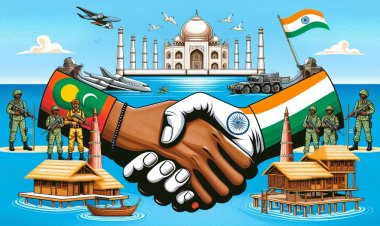The Economic and Political Impact of Indian Tourists on the Maldives
Explore the intricate relationship between Indian tourists and the Maldives: their economic boon, political implications, and the future of this crucial partnership amid the recent row.

Introduction
In this blog, we will discuss the economic and political impact of Indian tourists on the Maldives. This situation has recently been affected by the missteps of Maldivian President Mohammad Muu, which have put the goodwill shared between India and the Maldives at risk. We will explore the importance of Indian tourists to the Maldives, the threat to goodwill between the two nations, and the purpose of this blog.
Overview of the Situation
The Maldives heavily relies on tourism as a major driver of its economy, contributing around 23% of its GDP. Indian tourists have been the largest tourism market for the Maldives in recent years, with over 206,000 Indian tourists visiting the Maldives in 2023, making up 11.2% of the total foreign visitors. The number of Indian tourists has been steadily increasing, and many India-based tour operators have been offering curated trips to the Maldives.
The importance of Indian tourists to the Maldives
Indian tourists play a significant role in the Maldives' economy and tourism sector. They contribute to foreign exchange earnings, provide employment opportunities, and stimulate the growth of related industries such as transportation and communication. The Maldives heavily depends on the money that Indian tourists bring in to support its citizens' way of life.
Threat to Goodwill between India and the Maldives
The recent actions and remarks made by President Mohammad Muu have strained the goodwill between India and the Maldives. These actions, including breaking diplomatic traditions and promoting anti-India sentiments, have led to a boycott movement by Indian tour operators and travellers. This boycott, if it continues to gain momentum, could have severe economic and political repercussions for the Maldives.
Purpose of the Blog
The purpose of this blog is to shed light on the potential consequences of the strained relationship between India and the Maldives due to the actions of President Mohammad Muu. By understanding the economic and political impact of Indian tourists on the Maldives, we can gain insights into the significance of maintaining a positive relationship between these two nations. Additionally, this blog aims to raise awareness about the potential implications of the boycott movement and the importance of preserving goodwill between India and the Maldives.
The Economic Significance of Indian Tourists
The Maldives heavily relies on tourism as a major driver of its economy, contributing around 23% of its GDP. Indian tourists have been the largest tourism market for the Maldives in recent years, with over 206,000 Indian tourists visiting the Maldives in 2023, making up 11.2% of the total foreign visitors.
Indian tourists play a significant role in the Maldives' economy and tourism sector. They contribute to foreign exchange earnings, provide employment opportunities, and stimulate the growth of related industries such as transportation and communication. The Maldives heavily relies on the income generated by Indian tourists to support the livelihoods of its citizens.
The number of Indian tourists has been steadily increasing over the years. In fact, Indian tourists in the Maldives have nearly doubled in the past five years. This growth in Indian tourists has been attributed to the increased promotion of the Maldives as a tourist destination by India-based tour operators. These operators have been offering curated trips to the Maldives, including diving experiences, sailing trips, and budget trips to local islands.
However, there is currently a boycott movement by Indian tour operators and travellers due to the recent actions and remarks made by Maldivian President Mohammad Muu. These actions have strained the goodwill between India and the Maldives, leading to a potential decrease in Indian tourists visiting the Maldives.
The boycott by Indian tour operators and travellers can have severe economic and political repercussions for the Maldives. The tourism sector, which heavily relies on Indian tourists, will be significantly impacted. The transportation and communication sectors, which are closely linked to tourism, will also suffer. This boycott movement threatens the livelihoods of those employed in the tourism and related industries.
It is important to maintain a positive relationship between India and the Maldives to preserve the economic benefits brought by Indian tourists. The income from Indian tourists is crucial to the Maldives' economy, employment opportunities, and various sectors. The boycott movement raises awareness about the potential consequences of strained relations and highlights the significance of preserving the goodwill between India and the Maldives.
The Potential Impact on Tourism and Related Sectors
The strained relationship between India and the Maldives due to the actions of President Mohammad Muu has the potential to significantly impact tourism and related sectors in the Maldives. Here are some key points to consider:
The boycott movement is gaining momentum.
A boycott movement by Indian tour operators and travellers is gaining momentum. This movement is a direct response to the recent actions and remarks made by President Mohammad Muu. The boycott, if it continues to gain traction, could have severe economic and political repercussions for the Maldives.
Impact on Tour Operators and Travel Portals
The boycott movement has already led to tour operators and travel portals, such as e-MyTrip, joining the campaign to boycott the Maldives. The suspension of flight bookings and hotel reservations for the Maldives by these platforms can have a significant impact on the tourism sector in the Maldives.
Decrease in Indian Tourists to the Maldives
Indian tourists have been the largest tourism market for the Maldives in recent years. However, due to the strained relationship between India and the Maldives, there is a potential decrease in Indian tourists visiting the Maldives. The revenue that the Maldives' tourism industry generates may directly suffer from this decline in Indian visitors.
Effect on Transportation and Communication Sectors
The tourism sector in the Maldives is closely linked to the transportation and communication sectors. If the boycott movement gains further momentum, there will be a significant decrease in the number of tourists visiting the Maldives. This decrease can have a ripple effect on transportation services, such as sea planes and domestic airlines, as well as communication services that cater to tourists. The livelihoods of those employed in these sectors will be at risk.
It is crucial to maintain a positive relationship between India and the Maldives to mitigate the potential impact on tourism and related sectors. The Maldives heavily depends on the money that Indian tourists bring in to support its economy and create job opportunities. The boycott movement raises awareness about the potential consequences of strained relations and highlights the significance of preserving the goodwill between India and the Maldives.
Job Losses and Economic Consequences
The Maldives heavily relies on tourism as a major driver of its economy, contributing around 23% of its GDP. Indian tourists have been the largest tourism market for the Maldives in recent years, with over 206,000 Indian tourists visiting the Maldives in 2023, making up 11.2% of the total foreign visitors.
Employment opportunities in the Maldives, especially in tourist resorts, heavily rely on the influx of Indian tourists. Tourist resorts alone employ nearly 45,000 workers, with 47% of them being locals. The income generated from tourism supports the livelihoods of these workers and their families.
However, the recent strain in the relationship between India and the Maldives, caused by the actions of President Mohammad Muu, has led to a boycott movement by Indian tour operators and travellers. If this boycott continues to gain momentum, there is a potential for job losses in the tourism sector.
The tourism sector in the Maldives, along with the transportation and communication sectors, which are closely linked to tourism, will be negatively impacted by the decrease in Indian tourists. This boycott movement threatens the jobs of those employed in the tourism and related industries.
The decline in Indian tourists visiting the Maldives can have severe economic consequences. The Maldives' overall economy depends heavily on the revenue from tourism. The decline in revenue from tourism can result in a decrease in foreign exchange earnings, which will negatively impact the country's economy.
The transportation and communication sectors, which heavily rely on tourism, will also suffer. Seaplanes and domestic airlines, which transport tourists to and from the Maldives, will experience a significant decrease in demand. This decrease will directly affect the employment opportunities and incomes of those working in these sectors.
It is crucial to maintain a positive relationship between India and the Maldives to mitigate potential job losses and negative economic consequences. Many Maldivians depend on the income from Indian tourists for their livelihoods, so the decline in Indian visitors could hurt the country's economy as a whole.
The boycott movement raises awareness about the potential impact of strained relations and highlights the significance of preserving the goodwill between India and the Maldives. The Maldives needs to address the concerns of Indian tour operators and travellers to ensure the continued flow of Indian tourists, which is crucial for the country's economy and job market.
Healthcare and education
Indian assistance in healthcare and education plays a crucial role in the Maldives, benefiting both nations. Here are some key points to consider:
Importance of Indian Assistance
Indian assistance in healthcare and education is of great importance to the Maldives. It helps improve the quality of healthcare services and educational opportunities available to the people of the Maldives. This assistance strengthens the bilateral relationship between the two nations and fosters goodwill.
Scholarships and training opportunities
Indian scholarships and training opportunities provide Maldivian students with access to higher education and specialised training programmes. Every year, around 40 Maldivian students receive scholarships from the Indian Council for Cultural Relations. These scholarships enable students to pursue their academic and career goals.
Contribution of Indian Teachers and Doctors
Indian teachers and doctors make significant contributions to the healthcare and education sectors in the Maldives. Indian teachers teach senior classes in the Maldives, comprising 25% of the senior teaching staff. Indian doctors also play a vital role, supporting the healthcare system and providing essential medical services.
Impact on the Healthcare and Education Sectors
Indian assistance has a positive impact on the healthcare and education sectors in the Maldives. It helps improve healthcare infrastructure, medical facilities, and the overall quality of healthcare services. Additionally, Indian assistance in education enhances educational institutions, curriculum development, and teaching methodologies.
This support contributes to the development of a skilled workforce in various fields, including medicine, engineering, and technology. It also fosters cultural exchange and promotes mutual understanding between India and the Maldives.
Overall, Indian assistance in healthcare and education strengthens the bond between the two nations and brings about positive changes in the lives of the Maldivian people. It is crucial to maintain this collaboration to ensure continued progress and development in these sectors.
National Defence and Security
India's role in the Maldives' defence training:
-
India has trained over 1,500 Maldivian National Defence Force (MNDF) trainees in the past 10 years.
-
India meets 70% of the Maldives' defence training requirements.
-
India has historically assisted the Maldives in times of crisis, including coup attempts and natural disasters.
Historical assistance provided by India:
-
In 1988, India assisted the Maldives during a coup attempt.
-
In 2004, India was the first country to send help to the Maldives after the Indian Ocean tsunami.
-
In 2014, India sent water to the Maldives during a water crisis.
-
In 2020, India sent 30,000 doses of the measles vaccine to prevent an outbreak in the Maldives.
The significance of territorial proximity for security:
-
The Maldives is located just 70 nautical miles from India's Minicoy Islands and 300 nautical miles from India's West Coast.
-
Indian assistance and friendship help ensure the security and well-being of the Maldivian people.
-
Territorial proximity allows for quick response and assistance in cases of emergencies or crises.
Potential consequences of strained relations:
-
If India applies political heat to the Maldives, it can lead to political instability and public unrest.
-
The tourism sector, transportation sector, and communication sector in the Maldives heavily rely on Indian tourists. A boycott by Indian tour operators and travellers can have severe economic repercussions.
-
Job losses in the tourism and related industries can have a negative impact on the livelihoods of Maldivians.
-
The Maldives' healthcare and education sectors benefit from Indian assistance, which can be at risk if relations are strained.
-
Maintaining a positive relationship between India and the Maldives is crucial for the overall security and well-being of the Maldivian people.
The Potential Political Fallout
President Mohammad Muu's actions and their consequences:
-
President Mohammad Muu's missteps have put the goodwill shared between India and the Maldives at risk.
-
His actions, including breaking diplomatic traditions and promoting anti-India sentiments, have strained the goodwill between the two nations.
-
This strain in the relationship threatens to burn the Maldives, jeopardising the interests of ordinary Maldivians, including their jobs, salaries, healthcare, and education.
The suffering of the Maldivian people:
-
The potential boycott of Indian tourists to the Maldives, caused by the strained relationship, would have severe economic and political repercussions for the country.
-
The Maldives heavily relies on tourism as a major driver of its economy, and Indian tourists have been the largest tourism market in recent years.
-
A decrease in Indian tourists visiting the Maldives would directly impact the income generated by the tourism industry and threaten the livelihoods of those employed in the sector, as well as related industries such as transportation and communication.
-
The crunch of good human capital in the Maldives exacerbates the potential suffering of the Maldivian people, as the country heavily relies on Indian assistance in healthcare, education, and national defence.
China's influence and its limitations:
-
President Mohammad Muu has turned to China to intensify efforts to send more tourists to the Maldives, but China's influence may have limitations in mitigating the potential fallout.
-
The economic slowdown in China and the current restrictions on Chinese tourists due to travel concerns may limit the number of Chinese tourists willing to travel to the Maldives.
-
The campaign of Indian influencers and celebrities urging their followers to visit Indian islands instead of the Maldives could have a significant impact on redirecting tourism away from the Maldives and towards India.
-
The boycott movement by Indian tour operators and travelers, coupled with potential cancellations of flight bookings and hotel reservations, threatens the tourism sector and related industries, further limiting the economic support provided by Indian tourists.
In conclusion, the potential political fallout from the strained relationship between India and the Maldives, caused by the actions of President Mohammad Muu, could result in severe consequences for the Maldives and its people. The boycott movement by Indian tour operators and travellers, the decline in Indian tourists visiting the Maldives, and the potential impact on the economy, job market, healthcare, education, and national defence highlight the need for maintaining a positive relationship between India and the Maldives. Preserving the goodwill between these two nations is crucial for the well-being and prosperity of the Maldivian people.
The safety concerns with the Boeing 737 Max in India
Recent findings of missing parts in Indian Max planes have raised serious safety concerns. During inspections ordered by the Directorate General of Civil Aviation (DGCA) in India, it was discovered that some of the planes had missing washers, which are essential for holding screws in place. While a missing washer may seem insignificant, it can have fatal consequences in the aviation industry. In a recent incident, an Alaska Airlines flight experienced a blown-out door in midair, which might have been due to loose bolts or missing washers.
The relevance of the Alaska Airlines incident cannot be ignored. If a similar incident were to occur in Indian skies, the consequences could be catastrophic. It is a miracle that everyone on board the Alaska Airlines flight survived, but such luck cannot be relied upon in every situation. A missing washer or loose hardware could potentially lead to structural failures or in-flight emergencies, putting the lives of passengers and crew at risk.
In addition to the missing parts, installation issues and loose hardware have also been reported on United Airlines planes, further raising concerns about the safety of Boeing 737 Max aircraft. United Airlines found installation issues in the door plugs of at least 10 of its planes. This indicates a failure in the proper assembly and maintenance of the aircraft, highlighting potential vulnerabilities that could compromise passenger safety.
Considering these safety concerns, there is a pressing need to ground the Boeing 737 Max fleet in India. The potential risks associated with flying these aircraft outweigh any operational issues that may arise from grounding the fleet. Passenger safety should always be the top priority in the aviation industry, and necessary measures must be taken to ensure the airworthiness of all aircraft operating in Indian skies.
The Dangers of Plastic in Bottled Water
A recent study has revealed high levels of plastic particles in bottled water, raising concerns about the potential dangers to human health. The study found the presence of both nanoparticles and microplastics in bottled water, highlighting the extent of the problem.
Nanoparticles are extremely small, measuring only 1/1000th the width of a human hair. These particles can easily travel through the body's tissues and into the bloodstream, spreading synthetic chemicals to internal organs. It is estimated that a litre of bottled water contains approximately 240,000 nanoparticles, with 90% of them being nanoparticles.
Microplastics, although slightly larger than nanoparticles, are still a cause for concern. These tiny plastic particles can also enter the body and disrupt cellular processes. They can introduce toxic substances, such as bisphenols, which are used in the manufacturing process of plastics.
The health concerns surrounding plastic particles in bottled water are severe. Studies have found these particles in placentas, lungs, and even blood. There is growing anxiety about the potential effects on vital organs and the development of unborn children.
This research has shed new light on the extent of plastic pollution in bottled water. Major American drinking water brands were found to contain between 110,000 and 370,000 plastic particles per litre. This raises important questions about the safety of consuming bottled water and the potential long-term effects on human health.
In light of these findings, there have been calls for using alternative containers for drinking water. Glass or stainless steel containers are recommended, as they do not release plastic particles into the water. Making the switch to these alternatives can help reduce exposure to harmful plastic particles.
This study has been hailed as a major breakthrough, providing a new way to identify and analyse plastic particles in bottled water. It has opened doors for further research into the origins and effects of these particles on human health.
Let's go to Lakshwadeep!



 admin
admin 










